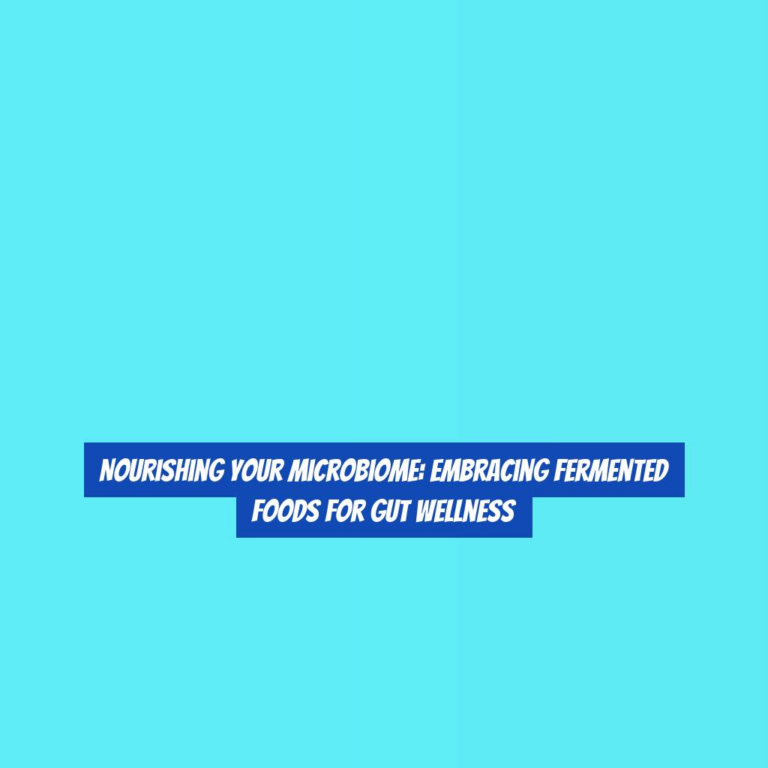Fueling Your Gut Garden: Incorporating PrebioticRich Foods for Digestive Health
Are you tired of constantly battling digestive issues and feeling like your gut health is out of your control? ItG??s time to take charge of your gut garden by incorporating prebiotic-rich foods into your daily diet.
By understanding the role of prebiotics in supporting your gut microbiome, you can lay the foundation for a healthier digestive system. But where do you start?
LetG??s explore the top prebiotic-rich foods that can help nourish your gut garden and promote better digestive health.
Understanding Prebiotics and Gut Health
To maintain a healthy gut, itG??s essential to understand the role of prebiotics in supporting digestive health. Prebiotics are non-digestible fibers that act as food for the beneficial bacteria in your gut. By nourishing these good bacteria, prebiotics help to maintain a balanced and thriving gut microbiome, which is crucial for overall digestive health.
When these beneficial bacteria are well-fed, they can outcompete harmful microorganisms, support the gut lining, and even produce essential nutrients like short-chain fatty acids. This can lead to improved digestion, better nutrient absorption, and a strengthened immune system.
Incorporating prebiotic-rich foods into your diet, such as garlic, onions, bananas, and asparagus, can help to ensure that your gut microbiome remains diverse and healthy. By understanding the importance of prebiotics and actively including them in your diet, you can take a proactive approach to supporting your digestive health from the inside out.
Top Prebiotic-Rich Foods to Incorporate
Incorporate these top prebiotic-rich foods into your diet to support a diverse and healthy gut microbiome.
Garlic: This flavorful bulb isnG??t only a great addition to many dishes but also a fantastic source of prebiotics, particularly in the form of fructooligosaccharides. These compounds help nourish beneficial gut bacteria, promoting a balanced microbiome.
Onions: Onions are rich in inulin, a type of prebiotic fiber that serves as a fuel source for the good bacteria in your gut. Whether raw in salads, caramelized in a savory dish, or incorporated into soups and stews, onions can be a versatile way to boost your prebiotic intake.
Bananas: Unripe bananas are an excellent source of resistant starch, which acts as a prebiotic in the gut. This type of fiber resists digestion in the small intestine and ferments in the large intestine, providing fuel for beneficial bacteria and promoting a healthy gut environment.
These prebiotic-rich foods can easily be incorporated into your daily meals, helping to nourish the good bacteria in your gut and contribute to overall digestive wellness.
Cooking Tips for Prebiotic-Rich Foods
Enhancing the prebiotic content of your meals can be achieved through simple cooking techniques that preserve the beneficial fibers in foods like garlic, onions, and unripe bananas. When cooking with prebiotic-rich foods, itG??s important to use gentle heat and minimal water to retain their beneficial properties.
Raw or lightly cooked garlic and onions are excellent sources of prebiotics. Avoid overheating them to preserve their prebiotic content. For unripe bananas, consider using them in smoothies or incorporating them into recipes where they can be lightly cooked, as heating can break down the prebiotic-resistant starches.
Additionally, consider including prebiotic-rich foods in salads, as raw vegetables are a great way to maintain their prebiotic content. When preparing prebiotic-rich vegetables like asparagus and leeks, lightly steam or saut+? them to ensure they retain their prebiotic fiber.
Lastly, consider incorporating prebiotic-rich grains like barley and oats into your meals by using gentle cooking methods such as simmering or soaking, as this helps maintain their prebiotic qualities. By following these simple cooking tips, you can maximize the prebiotic benefits of the foods you consume.
Creating Prebiotic-Rich Meal Plans
Consider including a variety of prebiotic-rich foods in your meal plans to support digestive health. Including these foods in your meals can help nourish the beneficial bacteria in your gut, promoting overall digestive wellness. Here are some simple ways to create prebiotic-rich meal plans:
Incorporate a variety of vegetables: Aim to include a diverse range of vegetables such as garlic, onions, leeks, asparagus, and Jerusalem artichokes in your meals. These vegetables are rich in prebiotic fibers that provide nourishment for the good bacteria in your gut.
Include whole grains: Choose whole grains like oats, barley, and quinoa to add a dose of prebiotic fibers to your meal plans. These grains arenG??t only nutritious but also support the growth of beneficial gut bacteria.
Add fruits high in prebiotics: Incorporate fruits such as bananas, apples, and berries into your meal plans. These fruits contain prebiotic fibers that can help promote a healthy gut environment.
Lifestyle Habits for Supporting Gut Health
To continue supporting your digestive health, adopting lifestyle habits that promote a healthy gut environment is essential.
Getting regular exercise is crucial for maintaining a healthy gut. Physical activity helps to stimulate the muscles in your digestive system, promoting regular bowel movements and overall gut health. Aim for at least 30 minutes of moderate exercise most days of the week to support your gut.
Another important lifestyle habit for gut health is managing stress. Chronic stress can negatively impact your gut, leading to inflammation and digestive discomfort. Incorporating stress-reducing activities such as yoga, meditation, deep breathing exercises, or spending time in nature can have a positive impact on your gut health.
Additionally, ensuring that you get an adequate amount of sleep each night is vital for a healthy gut. Poor sleep habits can disrupt the balance of bacteria in your gut and lead to digestive issues. Strive for 7-8 hours of quality sleep each night to support your gut microbiome.
Conclusion
Incorporating prebiotic-rich foods into your diet can help fuel your gut garden and support digestive health. By understanding the role of prebiotics and incorporating top prebiotic-rich foods into your meals, you can create a balanced and healthy gut environment.
Cooking with prebiotic-rich foods and creating meal plans centered around these ingredients can further support your gut health. Combined with lifestyle habits, you can take proactive steps to nourish and care for your gut.






